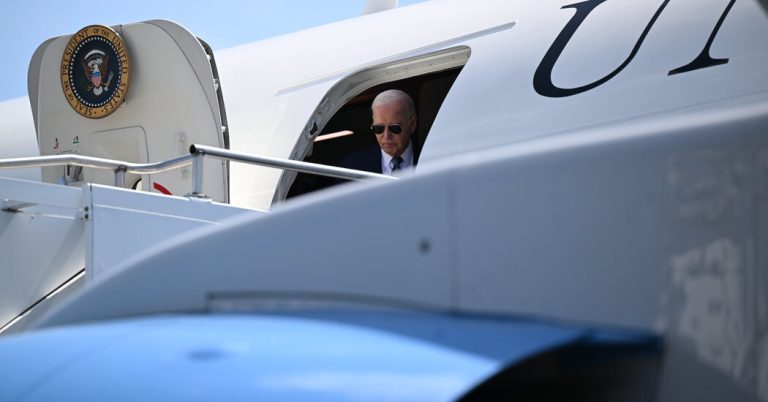Air Force One is quite comfortable if you’re its most privileged frequent flyer, with a comfortable bedroom and a spacious office.
However, most US presidents will try to avoid making two round trips to Europe, separated by about 60 hours on the ground at home. Yet that’s what President Biden is doing this week.
“The president’s schedule is full. It is,” said White House press secretary Karine Jean-Pierre. “There is much to be done on behalf of the American people.”
Mr. Biden left the United States for D-Day celebrations in France last Wednesday, June 5. Stayed over the weekend for a state dinner in Paris. and returned home to Delaware late Sunday. He left Washington again early Wednesday, June 12, to fly to the southeastern coast of Italy for the annual Group of 7 gathering, the traditional summit of the leaders of Britain, Canada, France, Germany, Italy and of Japan.
When Mr. Biden looks back on those two round trips—about a day and a half’s flight—he can only remember what happened in between: the conviction of his only son, Hunter Biden, on charges that he lied to obtain a gun license .
But the two round trips beg the question: Why didn’t he stay in Europe for a few days, play golf, visit some American soldiers, maybe rub shoulders with a foreign leader or two? He is, after all, 81 years old, and some of his assistants who are half his age have been complaining of missing sleep cycles.
The White House’s explanation for four transatlantic crossings in nine days was simply that Mr. Biden had commitments in Washington. But by presidential standards, his public schedule seemed light: a lunch with Vice President Kamala Harris, a June concert and a speech to a gun safety group.
Hunter Biden’s trial also featured in the schedule, although it was impossible to know when those trips were planned that the case would go to court and a verdict would be handed down in the three days between the D-Day trip and the G7 meeting. As it turned out, Mr Biden returned to Delaware on Tuesday afternoon to be with his son before taking off again in the morning.
But privately, some aides said the election-year visuals needed to be considered. There was no urgent reason to stay in Europe, and a few days away “might not look good,” one of Mr. Biden’s advisers admitted, though the aide quickly added that Mr. Biden never had a hard day. In any case, no one wanted images of the president on what his political opponents might describe as a European holiday, at least while he is running for re-election. A long weekend in Rehoboth, the Delaware town where he and his wife, Jill, have a beach house, might be one thing. a few days in France or Italy have a completely different look.
The presidency, of course, is the ultimate job from anywhere. There are instant communications (a White House truck, full of antennas, trips in every motorcade) and a staff of hundreds ready to cover any eventuality, whether it’s sending a thank-you note or a retaliatory nuclear strike.
Intolerance of seeing presidents abroad, except for work, has a long history. Franklin D. Roosevelt loved to camp on Campobello Island, Canada, though as president he kept visits short. When Harry S. Truman went to Potsdam, Germany to negotiate with Joseph Stalin and Winston Churchill about what Europe would look like after World War II, he stayed for more than two weeks. There were days off from negotiations, but not for long, and the nearest big city, Berlin, was a bombed wreck. And there was a reminder of the perils of being out of town: Churchill’s party lost to Labor during the conference and he was dismissed from office while it was still going on.




